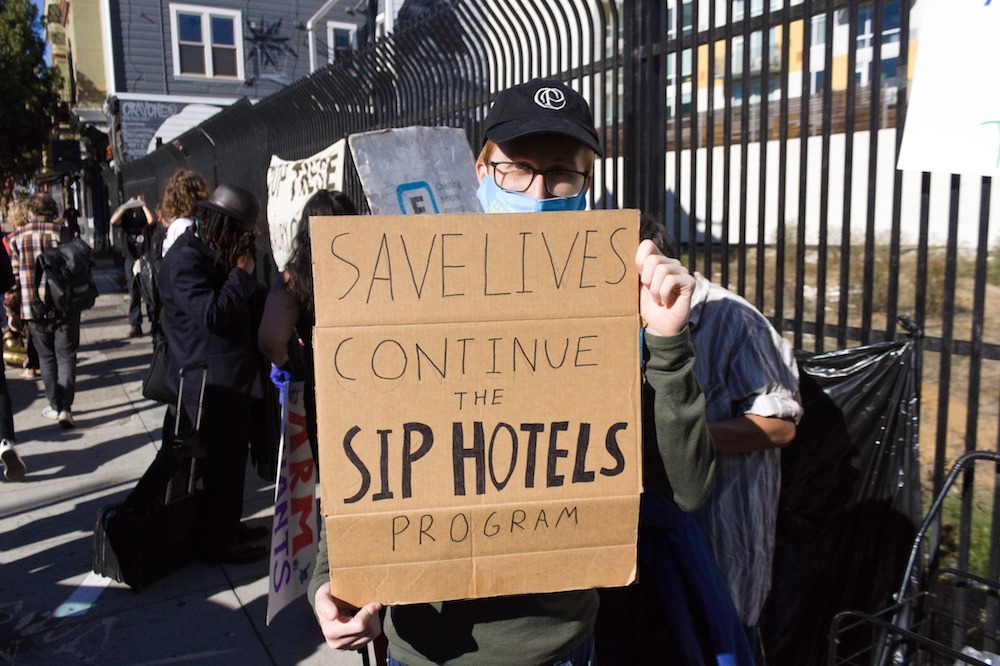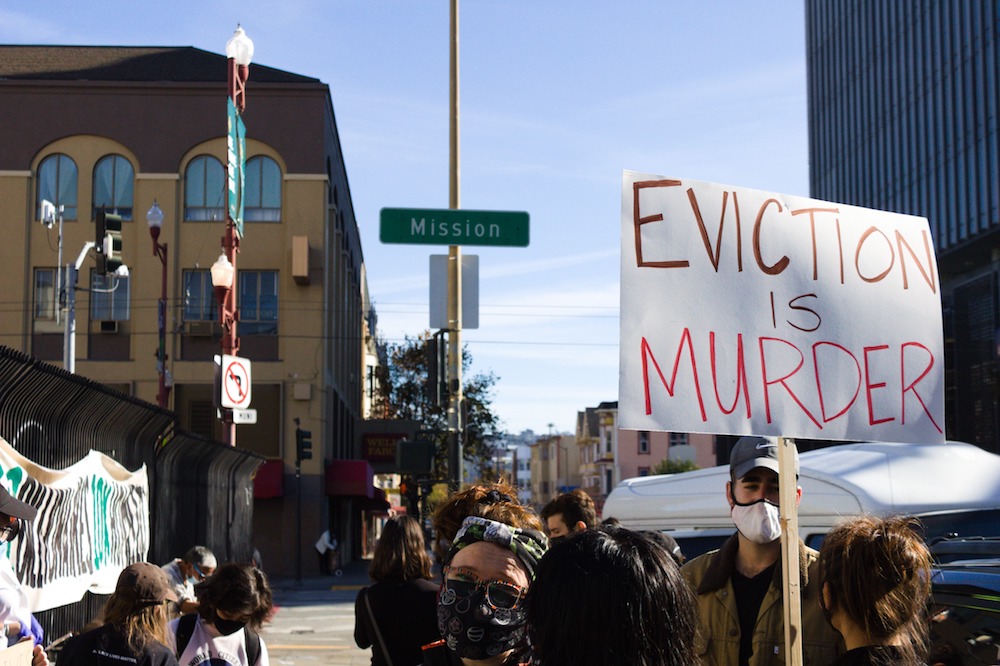About 30 people gathered this morning outside of 2588 Mission Street — the site of a former apartment building that was destroyed in a January 2015 fire that killed one tenant, Mauricio Arellano, and displaced 60 others — to protest the city’s decision to end the SIP hotel program, which has allowed 2300 homeless San Franciscans to shelter in place in hotel rooms since April, starting in December.

It was one of two protests against the closure of the SIP hotels this morning, with the other at 420 Montgomery Street. The protests were organized by Hotels not Hospitals, a group of housed and unhoused community activists which rents hotel rooms with community-donated funds.
“We are furious that the city in its gross negligence and callousness has decided to end the shelter-in-place housing programs,” said Sylvia Viviana, an organizer from Hotels not Hospitals, to jeers and boos from the crowd. “There is currently no plan for what will happen to these folks.”
This protest comes after the closure plan was presented to the full Board of Supervisors on Tuesday by Abigail Stewart-Kahn, interim director of the Department of Homelessness and Supportive Housing. The presentation left the supes bewildered at the lack of details and with no pressing financial reason for ending the program.

City Controller Ben Rosenfield admitted that he has seen no evidence that the Federal Emergency Management Agency’s month-to-month reimbursement of 75 percent of the SIP hotel leasing expenses will end this year, and the Biden administration seems likely to allocate billions of dollars to fund affordable housing.
During her presentation to the board Tuesday, Stewart-Kahn said that one reason for ending the SIP hotel program is because homeless people with guaranteed housing in hotel rooms could lead to having “no motivation to take steps to exit homelessness.” Community members present were upset by Stewart-Kahn’s notion, and said it was disconnected from the reality that homeless people face trying to navigate San Francisco’s oft-labyrinthine system of support and resources to connect people to housing.
“They know what happens when you get pulled into the system. Often times it’s bullshit,” said Frankie Carlsson, an organizer with Rad Mission Neighbors, a grassroots group fighting to end the criminalization of homeless people, sex workers, and other marginalized groups. “I was helping my best friend who has two kids trying to get her housed in the city for four years, and they would say ‘talk to this person, talk to that person’, we did everything they told us, to no avail. So when people come and say ‘they are resistant,’ that’s an excuse for you to not provide services. No, I don’t want to go into this line that will give me nothing. No, I don’t want to talk to this social worker who will tell me there is no housing.”
Stewart-Kahn’s lack of clarity, and the awful timing of the decision to close the SIP hotels, was roundly criticized.
“Abigail Stewart-Kahn outlined a SIP rehousing commitment plan that will require the closures to be swift in order to provide those who are currently residing at the SIP hotels with permanent housing,” said C.H. Zazueta, a member of Gay Shame, a San Francisco-based organization dedicated to advocating for marginalized groups. “However, Stewart-Kahn fails to provide a clear idea of what permanent housing looks like while simultaneously promising that there will be exits to stability and not the streets. However, we have seen with some of the recent hotel and site closures that only 30 percent of people will be placed into permanent housing.”
Joe Wilson, who works with the Homeless Emergency Services Provider Association, said that only one in five people will receive a housing referral. And keep in mind that this commitment to rehousing does not apply to the thousands of San Franciscans who are currently on the streets while these hotels have been in operation.
“The closures of the SIP hotels will put thousands of people at risk of returning to the streets and hundreds of essential workers being laid off, all before the holidays, during winter, during a pandemic, just before the second [COVID-19] wave,” said Zazueta.
Hotels not Hospitals released a list of demands that was read aloud during the protest and includes continuing to house the city’s homeless in SIP hotel rooms, a moratorium on all evictions, pathways to permanent affordable housing, and an end to street sweeps, which can often result in seizure of money and property by city workers or police.
“Forcing people out of their homes because they are too sick or too poor is wrong and there is no justification, it is murder,” said Viviana, referring to the unprecedented COVID-19 wave that has occurred this fall, breaking records in hospitalizations and new cases of the virus in the United States.
Other demands included using millions of dollars of Prop C funds earmarked for homelessness services and affordable housing construction, which opened up following a California Supreme Court decision in September.
When asked about why Prop C funds have not been used to fund SIP hotels, HSH said that the funds are still on Budget and Finance Committee reserve, and are therefore currently unavailable. HSH also refused to say which hotels or how many hotels would be closed by the end of December.
You can donate to Hotels not Hospitals to help them rent rooms for homeless folks during the pandemic either through Cashapp or through its GoFundMe, which has so far raised more than $36,000.






